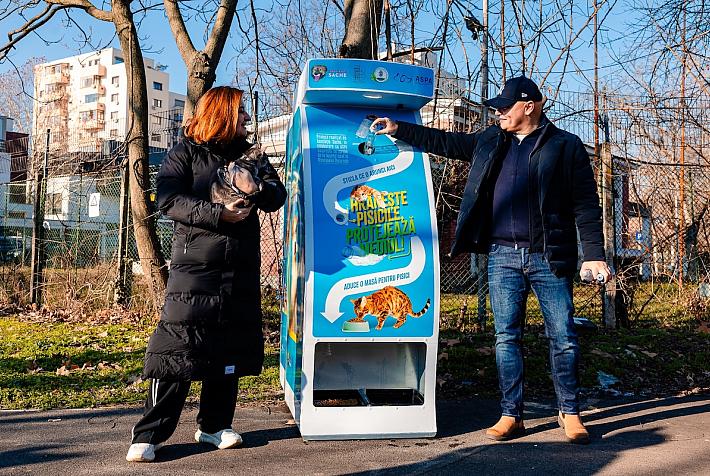Do you speak Romanian? They do. Expats in Romania balance survival skill and cultural immersion

 Foreign language centers in Romanian started to add more Romanian language courses to their offer during the last few years, as a result of the growing number of expats who live in Romania and want to speak the local language. For most expats, learning the language is a survival skill in a foreign land. Others just fell in love with the country, its people and wanted to understand them better. Romania-Insider.com has learned some Romanian language learning stories.
Foreign language centers in Romanian started to add more Romanian language courses to their offer during the last few years, as a result of the growing number of expats who live in Romania and want to speak the local language. For most expats, learning the language is a survival skill in a foreign land. Others just fell in love with the country, its people and wanted to understand them better. Romania-Insider.com has learned some Romanian language learning stories.
By Irina Popescu, irina.popescu@romania-insider.com
Romania has proved to be the land where most locals understand foreigners, which made it easy for many to live in the country for years in a row without properly learning the language. Romanians are skilled in several languages, the most widespread being English, French, German, Spanish. This is what made the country a good call center outsourcing place, for example.
Even so, and despite the fact that some expats have fled the country once the crisis has kicked in, “the number of foreigners who learn Romanian has clearly increased. For many, learning the Romanian language is a necessity; for some, Romanian is a passion, as they want to be able to make comparisons between several languages”, said Dan Pologea, marketing director at Rolang School.
There are now more foreigners living in Romania who were not simply sent her on a three-year contract, and therefore many of them are more motivated to learn Romanian, says Delia Burham, country manager with CVO Recruitment. “I have met plenty of foreigners who have Romanian partners, and many of them, who respect their partner and want to understand their culture and nature better, learn Romanian, also to be able to speak to some relatives who do not know foreign languages,” she says. Delia speaks fluently Romanian.
Foreign language centers have picked up the trend. “In the Center for Foreign Languages A_Best, the number of foreigners studying the Romanian language has grown significantly in the last semester”, said Aura Ipate, general manager of the A_Best language center. On the other hand, Fides has seen a constant flow of people interested to learn Romanian in the last two years.
Either by taking classes or just paying close attention to their Romanian friends' vocabulary, the foreigners below have managed to master the Romanian language.

Martin Harris, the UK Ambassador to Romania, had to learn the Romanian language, given his position, and turned this into a cultural immersion experience. “I had three months of intensive training, with four hours lessons a day. I spent the last month living with a family in Iasi and studying at a school there. I had five teachers, and a charming host family - probably the best quality language training I have had in my career”, Martin Harris told Romania-Insider.com.

Jeffrey Franks, the chief of the International Monetary Fund mission to Romania, who has been travelling back and forth between Romania and the US in the last two years, has also learned Romanian in the process. He took Romanian language classes for six months in Washington, he said, and it has not been hard, as he already knew Russian, Spanish and French, which share some features with Romanian. Franks, who has been delivering some harsh news to Romania during his visits, started to write and read his speeches in Romanian, which may have sweetened the message.

Brazilian Saulo Spaolanse, who is the country manager of Schneider Electric in Romania, manages to speak Romanian with little foreign accent. He took Romanian language courses and tries to speak to his colleagues almost only in Romanian. “Portuguese and Romanian are not so different, so I could understand 20 percent of the words as soon as I came, without learning. Before learning, I used to receive many e-mails in two languages, Romanian and English”, Saulo Spaolanse said for Romania-Insider.com.
For some of the expats who live in Romania, learning the language has become a pleasure, beyond the point of surviving in a new environment.

Frederic Vigroux, communication officer with ESSEC Business School in Romania, started to learn Romanian immediatelly after arriving to Romania, two years ago. “I learned from Romanian people, writing down every new word on a little notebook, asking my colleagues “how do say that?”. It was only after having some basis that I took eight hours of courses to understand better the language and learn how to use the tenses and the grammar”, he told Romania-Insider.com.
For him, the Romanian language courses are not difficult if the teacher is good and if you have the knowledge basis, but he finds the individual courses far more expensive compared to the group ones. “What I did was cheaper, as it helped me learn the language in a real environment, which proves to be funnier and more encouraging, and also, that helpd me to socialize with Romanian people,” says Vigroux. When you are French, the Romanian language is not hard to learn. Especially if you learn how to master some tricks, “such as adding a Romanian touch sound at the end of a French word. It might work,” Vigroux confesses.

Others have actually chosen Romania for the language. Delia Burnham, now country manager of CVO Recruitment, wanted to learn another language besides French and German, live in a more remote part of Europe, and choose a language that is not too difficult, so she decided to move to Romania. “After three months I could speak conversational Romanian, after nine months I could speak, read and write very well, and after around two years I was probably at around the same level as I am know, but of course my vocabulary and sense for the language has improved since then” Delia, who has been living in Romania for eight years, told Romania-insider.com.
She thinks that learning a language is really a combination of willpower, determination, interest in another culture and lack of inhibition; anyone could learn any language up to a reasonable level if they believe they can and they want to.
Where to learn, how much does it cost
After 32 hours of Romanian language courses, you can engage in simple conversations, using simple expressions and you can form simple sentences, says the Rolang representative.
Prices for the Romanian language courses depend on the number of people in the group, the number of contracted hours and the type of language. Courses cover all levels, from beginner to advanced, being organized both individually or for groups. In terms of language, Romanian language courses adapt to customer needs, from everyday language to business or medical lingo. Check the language courses providers below.
Romanian language courses at the Fides foreign languages center are divided into 6 modules, each lasting from 8 to 11 weeks, and ends when the student reaches the advanced level, according to Daniela Barsan. “Overall, the frequency is 2 sessions per week, but there is a greater flexibility. We've even had daily classes, of 4 hours”, she added. For more information about Fides, go here: www.fidescentre.ro
At A_Best language center, the prices for the courses vary from RON 20 to RON 90, depending of the number of students per group, the distance to the learner's place, or the language in which the Romanian language is taught. “The course is conducted at your office, and you choose your schedule, holiday periods and colleagues”, said Aura Ipate, General Manager of A_Best language center. Starting September 1, 2011, A_Best will also organize online Romanian courses. More information, here: www.abest.ro
Rolang School offers Romanian language courses in groups of maximum 8 people, at a price of EUR 230, a module including 32 hours, an audio CD and Rolang manuals. Individual courses are more flexible, the program is being adapted at the student's specific needs, the price for 1 or 2 students being EUR 25 per hour. Rolang also organizes online Romanian language courses and two summer schools in Bucharest and one in Pipera. For more information, go here: www.rolang.ro
Have you learned or do you plan to learn Romanian? Let us know what was your experience with learning the language. Feel free to comment below.
Edited by Corina Saceanu, corina@romania-insider.com












